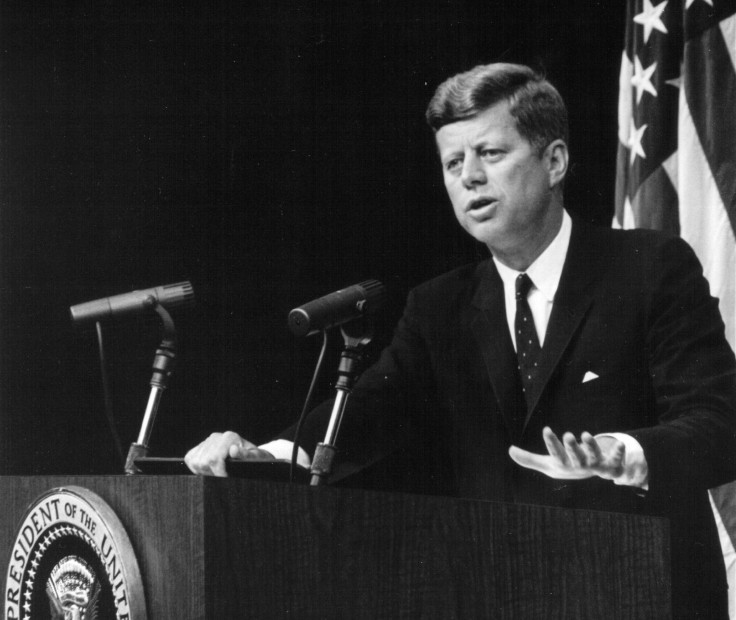Donald Trump Slated To Release Sealed John F Kennedy Assassination Documents

President Donald Trump announced on Twitter Saturday that he plans to release the classified documents that detailed the 1963 assassination of former President John F. Kennedy. The roughly 3,000 remaining assassination files, along with several previously redacted records, are slated to be unveiled Oct. 26, 2017.
"Subject to the receipt of further information, I will be allowing, as President, the long blocked and classified JFK FILES to be opened," Trump wrote in a tweet Saturday.
Subject to the receipt of further information, I will be allowing, as President, the long blocked and classified JFK FILES to be opened.
— Donald J. Trump (@realDonaldTrump) October 21, 2017
Twitter was flooded with mixed reactions to Trump's unexpected announcement. While many were excited by the news, several others equally claimed the document release makes the president look hypocritical because he continues to withhold his tax returns.
Several Twitter users lauded Trump's decision for transparency over the JFK assassination.
Thank you. This is the correct decision. Please do not allow exceptions for any agency of government. JFK files have been hidden too long. https://t.co/mqo7Q9XWt3
— Larry Sabato (@LarrySabato) October 21, 2017
Yes! President Trump will release the classified JFK Files. These files have been hidden for too long. https://t.co/q6flgRSpg4
— Makada __ (@_Makada_) October 21, 2017
Thank you Mr President for opening long blocked JFK files❤️__POTUS
— Donna Hallabuk (@gracy69epixnet) October 21, 2017
Many more said that they would rather see Trump's tax returns instead of the details of Kennedy's long-classified assassination.
You are simply a hypocrite. America cares more about your tax returns than they do about the JFK files -- an even that happened over 50 years ago!
— Ed Krassenstein (@EdKrassen) October 21, 2017
Could someone in the file room please insert a few of Trump’s tax returns in the middle of the JFK files?
— Steve Redmond (@sjredmond) October 21, 2017
Instead of the JFK files. How about @POTUS opening the long blocked and not classified Trump tax returns.
— Copley (@Woofield69) October 21, 2017
Others expressed their interest in finding out other confidential government information, including actor Kumail Nanjiani. Nanjiani shared his desire to hear about the government's potential interaction with aliens on Twitter, saying: "Hey Trump, while you're in a sharing mood, can you also declassify the UFO stuff? I mean have we talked to aliens or what?"
Hey Trump, while you’re in a sharing mood, can you also declassify the UFO stuff? I mean have we talked to aliens or what?!??!?
— Kumail Nanjiani (@kumailn) October 21, 2017
Let's open everything. I like this idea. Trump: if we have the right to know about JFK files we have the right to know your likely conflicts
— PORP (@TheOfficialPORP) October 21, 2017
Some also feel the decision is meant to detract from more pressing matters.
Here is how it goes. Trump will release the JFK files & distract the media while he does other things. Wait for it...#ShinyObjectStrategy
— Steven Martins (@SteveMartins_NB) October 21, 2017
Trump says he will release the “JFK Files.” This is just another smoke screen to distract from the 4 soldiers killed in Niger, the real death toll in Puerto Rico and the Russia Investigation.
— PROUD RESISTER _ (@ProudResister) October 21, 2017
The 1992 Kennedy Assassination Records Collection Act required that thousands of never-before-seen documents be released by Oct. 26, 2017. One final batch of documents has never been released to the public and the president is the only person with the power to block it, but only with probable reason to do so.
"Trump would have to certify to the National Archives that keeping the records secret is 'made necessary by an identifiable harm to military defense, intelligence operations, law enforcement or conduct of foreign relations,' and that the harm in question is greater than the public interest in disclosing the records,'" History.com reported in May.
The National Archives would have until Thursday to make the documents accessible to the public online. After a pre-processing examination in October 2014, the National Archives gathered a team of four archivists to help prepare for the release of the files in 2017.
"There are categories of records in the collection that, in accordance with the Act, will not be released in 2017," the National Archives wrote on its website. "We have identified a small number of records, or portions of records, that fit into these categories. For all other records, how long records stay withheld after 2017 will be determined by the President, who has final appeal authority."
Kennedy was shot while riding in a motorcade in Dallas on Nov. 22, 1963, and later died at Parkland Memorial Hospital. The assassination led to many conspiracy theories. Many have speculated that Kennedy's alleged assassin, Lee Harvey Oswald, didn't act alone.
© Copyright IBTimes 2024. All rights reserved.





















